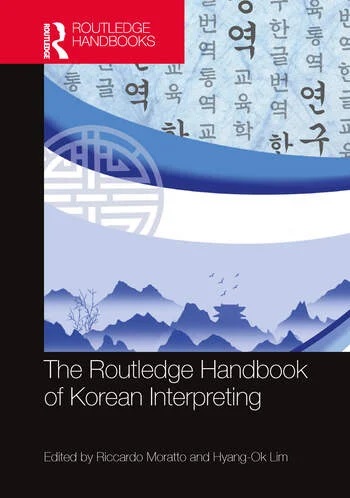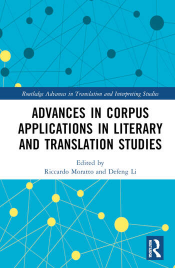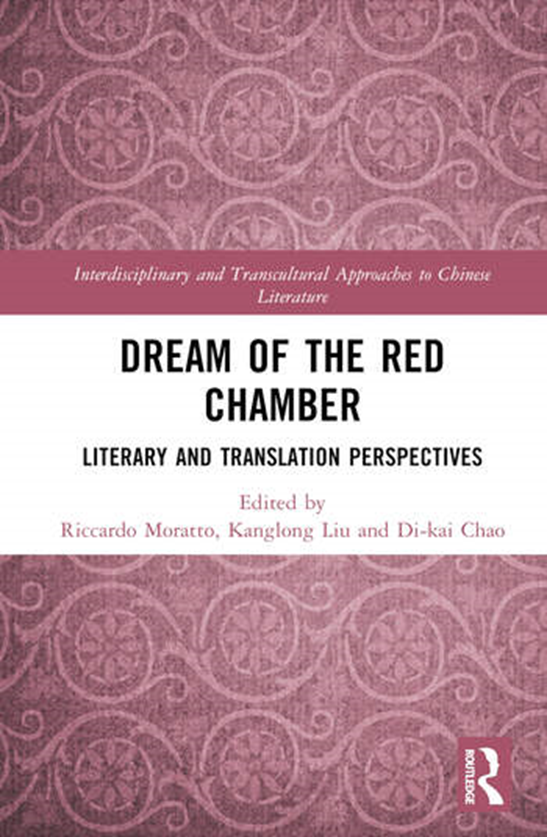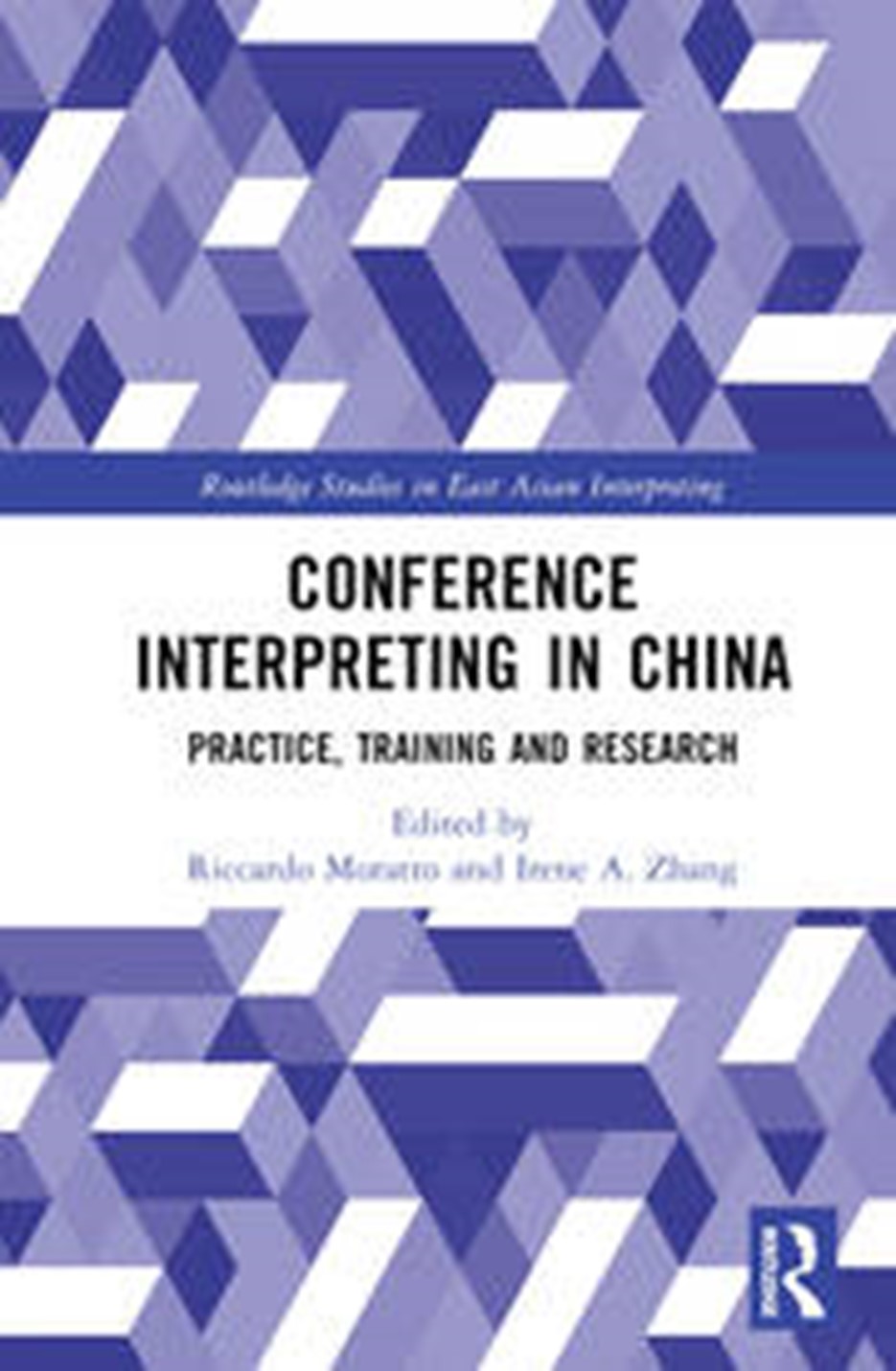
The Routledge Handbook of Korean Interpreting
Edited By Riccardo Moratto and Hyang-Ok Lim
Copyright Year 2023
Hardback £205.00
ISBN 9781032394374
Forthcoming by Routledge
512 Pages 95 B/W Illustrations
Book Description
Professor Moratto and Professor Lim bring together the most authoritative voices on Korean interpreting.
The first graduate school of interpretation and translation was established in South Korea 1979. Since then, not only has the interpretation and translation market grown exponentially, but so has research in Translation Studies. Though the major portion of research focuses on translation, interpretation has not only managed to hold its own, but interpretation studies in Korea have been a pioneer in this field in Asia. This Handbook highlights the main interpretation research trends in South Korea today, including case studies of remote interpreting during the Covid 19 pandemic, Korean interpreting for conferences, events and diplomacy, and research into educating interpreters effectively.
An essential resource for researchers in Korean interpreting, that will also be very valuable more widely, particularly to those working with other East Asian languages.
Table of Contents
Introduction, Riccardo Moratto and Hyang-Ok Lim
A HISTORICAL PERSPECTIVE
1.From Whence Do We Come? A Panoramic View of Interpretation in Korea with a Focus on Educational Institutions, Hyang-Ok Lim
2. A Study on the Activities of Interpreters and Translators in Politics, Diplomacy, and Society of the Goryeo and Joseon Dynasties, Hye-seung Lee and Jung-Hwa Yu
3. History of Interpreting in the Joseon Dynasty: Six Selected Interpreting Officials, Nam Hui Kim
4. In Search of Interpreters on the Demarcation Line, Hyo-eun Choi
5. Interpreters Portrayed in Korean News Media (1948-2022), Soyoung Park
6. Theoretical Constituents of Interpreting Research in Korea: A Meta-Analysis of Research Publications from 1998-2022, Ho-jeong Cheong and Hyun-Kyung Lim
EDUCATION
7. What’s Next? The Status Quo and Challenges of Undergraduate Interpretation and Translation Education in Korea, Daejin Kim 8. Redesigning the Learning Experience for the Consecutive Interpreting Classroom, Silhee Jin
9. Flipped Learning in the Undergraduate Interpretation and Translation Classroom, Haeyoung Kim
10. The Use of Interpreting Textbooks: A Survey Study, Mingri Jin and Andrew K.F. Cheung
11. An Analysis of Conference Interpreting Practices for Effective Pedagogy: Considerations for Simultaneous Interpretation between Korean and French, Hyewon Pyoun
12. The Present and Future of Korean MTI Education in China: A Case of Guangdong University of Foreign Studies, Mei Jin and Cheng Zhan
13. Let them Talk: Rethinking Learners’ Roles in Interpreting Performance Assessment, Najung Shin
14. A Case Study on Student Interpreters’ Self-assessment in Interpreting Training, Kyongjo Woo
15. A Systemic Functional Linguistic Analysis of the Consecutive Interpretation of Bong’s Oscar Award speech, Mira Kim and June Lee
COMMUNITY INTERPRETING
16. Healthcare Interpreting for Korean Immigrants in Australia: Linguistic and Cultural Perspectives, Jinhyun Cho
17. Australian Healthcare Interpreters’ Perceptions of the Challenges in Intercultural Communication, Sophia Ra
18. Analyzing the Motivations for Self-repairs among Russian Police Interpreters in South Korea, Seoyeon Hong
19. A Study on the Status of Interpretation for Arab Refugees in South Korea and Interpretation Improvement, Soonlei Gwag
20. On Training Sermon Interpreters: With Reference to Interviews with Sermon Interpreters and Surveys on User-expectations, Hayne Shin
21. Unwritten Rules and Indispensable Tools: Cultural Aspects of Korean Interpreting, Anastasia Guryeva
22. Korean Court Interpreting in the U.S.: History, Obstacles and Advanced Techniques, Robert Holloway
23. A Study of Interpreters' Speech Acts Based on a Corpus of Chinese-Korean Diplomatic Interpreting, Min Li, Zhu Zhu, Xin Yu, Xin Chen
OPPORTUNITIES FOR THE FUTURE
24. Research on Interpreters’ and Translators’ Cognition in Korea, Hye-yeon Chung
25. Exploring the Possibility of Using Speech-to-Text Transcription as a Tool for Interpretation, Julieae Lee
26. Market Demand for Professional Interpreting Services in South Korea, Jiun Huh
27 A Study of Technological Competence for Remote Interpreting and Current Status of Competence among Korea’s Interpreters, Jimin Lee
28. Remote Interpreting during COVID-19: A Case Study of an In-house Interpreter in Korea, Juyeon Lee
29. Evaluation of Korean Chinese Automatic Interpretation Quality, Pum-Mo Ryu and A-Young Kim
Editor(s)
Riccardo Moratto is Professor of Translation and Interpreting Studies at the Graduate Institute of Interpretation and Translation, Shanghai International Studies University, Chartered Linguist and Fellow Member of the Chartered Institute of Linguists (CIoL), editor-in-chief of Interpreting Studies for Shanghai Foreign Language Education Press, General Editor of Routledge Studies in East Asian Interpreting and General Editor of Routledge Interdisciplinary and Transcultural Approaches to Chinese Literature. Professor Moratto is a conference interpreter and renowned literary translator. He has published extensively in the field of translation and interpreting studies and Chinese literature in translation.
Hyang-Ok Lim is Professor at the Graduate School of Interpretation and Translation, Hankuk University of Foreign Studies since 1993 and is currently dean of the same institution. She is a founding member of the Korean Society of Conference Interpretation, the first academic society for translation studies in Korea, which publishes FORUM, an international Translation Studies journal. She is also on the Editorial Board InContext, a journal of Translation and Interculturalism. She has written numerous articles and books regarding interpretation.

Book Description
Professor Riccardo Moratto and Defeng Li present contributions focusing on the interdisciplinarity of corpus studies, with a special emphasis on literary and translation studies which offer a broad and varied picture of the promise and potential of methods and approaches. Inside scholars share their research findings concerning current advances in corpus applications in literary and translation studies, and explore possible and tangible collaborative research projects. The volume is split into two sections focusing on the applications of corpus in literary studies and translation studies. Issues explored include historical backgrounds, current trends, theories, methodologies, operational methods and techniques, as well as training of research students.
This international, dynamic, and interdisciplinary exploration of corpus studies and corpus application in various cultural contexts and different countries will provide valuable insights for any researcher in literary or translation studies who wishes to have a better understanding when working with corpora.
Table of Contents
Introduction
Riccardo Moratto and Defeng Li
1. Diachronic Trends in Fiction Authors’ Conceptualizations of Their Practices
Darryl Hocking and Paul Mountfort
2. Within-author Style Variation in Literary Nonfiction: The Situational Perspective
Marianna Gracheva and Jesse A. Egbert
3. Charles Dickens’ Influence on Benito Pérez Galdós Revisited: A Corpus-stylistic Approach
Pablo Ruano San Segundo
4. A Corpus-Stylistic Approach to the Literary Representation of Narrative Space in Ruiz Zafón’s The Cemetery of Forgotten Books Series
Guadalupe Nieto Caballero and Pablo Ruano San Segundo
5. Analyzing Who, What and Where in a Historical Corpus: A Case Study on the Chinese Buddhist Canon
Tak-sum Wong and John Sie Yuen Lee
6. Corpora and Literary Translation
Titika Dimitroulia
7. Orality in Translated and Non-translated Fictional Dialogues
Yanfang Su and Kanglong Liu
8. The Avoidance of Repetition in Translation: A Multifactorial Study of Repeated Reporting Verbs in The Italian Translation of The Harry Potter Series
Lorenzo Mastropierro
9. Feminist Translation of Sexual Content: A Quantitative Study on Chinese Versions of The Color Purple
Xinyi Zeng and John Sie Yuen Lee
10. Benefits of a Corpus-based Approach to Translations. The Example of Huckleberry Finn.
Ronald Jenn and Amel Fraisse
11. Are Translated Chinese Wuxia Fiction and Western Heroic Literature Similar? A Stylometric Analysis Based on Stylistic Panoramas
Kan Wu and Dechao Li
12. Translating Personal Reference: A Corpus-based Study of the English Translation of Legends of the Condor Heroes
Jing Fang and Shiwei Fu
13. Lexical Bundles in the Fictional Dialogues of Two Hongloumeng Translations: A Corpus-Assisted Approach
Kanglong Liu, Joyce Oiwun Cheung, and Riccardo Moratto
14. Mapping Culture-specific and Creative Metaphors in Lu Xun’s Short Stories by L1 and L2 English Translators: A Corpus-assisted Relevance-Theoretical Account
Linping Hou and Defeng Li
15. On a Historical Approach to Cantonese Studies: A Corpus-based Contrastive Analysis of the Use of Classifiers in Historical and Recent Translations of the Four Gospels
Tak-sum Wong and Wai-mun Leung
Editor(s) Biography
Riccardo Moratto (PhD, FCIL) is Professor of Translation and Interpreting Studies, Chinese Translation and Interpreting at the Graduate Institute of Interpretation and Translation, Shanghai International Studies University.
Defeng Li, Professor of Translation Studies, is Associate Dean of Faculty of Arts and Humanities and Director of the Centre for Studies of Translation, Interpreting and Cognition (CSTIC) at the University of Macau.

Dream of the Red Chamber: Literary and Translation Perspectives
Edited By Riccardo Moratto, Kanglong Liu, Di-kai Chao
Book Description
This edited volume contains an excellent collection of contributions and presents various informative topics under the central theme: literary and translation approaches to China’s greatest classical novel Hongloumeng.
Acclaimed as one of the Four Great Classical Novels of Chinese literature, Hongloumeng (known in English as The Dream of the Red Chamber or The Story of the Stone) epitomizes 18th century Chinese social and cultural life. Owing to its kaleidoscopic description of Chinese life and culture, the novel has also exerted a significant impact on world literature. Its various translations, either full-length or abridged, have been widely read by an international audience. The contributors to this volume provide a renewed perspective into Hongloumeng studies by bringing together scholarship in the fields of literary and translation studies. Specifically, the use of corpora in the framework of digital humanities in a number of chapters helps readdress many issues of the novel and its translations, from an innovative angle.
The book is an insightful resource for both scholars of Chinese literature and for linguists with a focus on translation studies.
https://www.routledge.com/Dream-of-the-Red-Chamber-Literary-and-Translation-Perspectives/Moratto-Liu-Chao/p/book/9781032284309
Editor(s) Biography
Riccardo Moratto is Professor at the Graduate Institute of Interpretation and Translation, Shanghai International Studies University, China.
Kanglong Liu is Assistant Professor in the Department of Chinese and Bilingual Studies, The Hong Kong Polytechnic University, China.
Dikai Chao is a PhD Candidate in the Department of Global, Cultural & Language Studies at the University of Canterbury, New Zealand.
Table of Contents
Foreword
Li-chuan Ou
Introduction
Literary and Translation Perspectives on Hongloumeng
Riccardo Moratto, Kanglong Liu and Di-kai Chao
Chapter 1
Beyond the Gender Binary: An Analysis of the Representation of Androgyny in Wang Xifeng
Jianwen Liu
Chapter 2
Aestheticizing Masculinity in Hongloumeng: Clothing, Dress, and Decoration
Louise Edwards
Chapter 3
The Red Chamber Dreams as an Intra- and Interculturally Integrative: Masterpiece of World Literature with Unique Characteristics
Martin Woesler
Chapter 4
A New Study on the "Second Master": The Generational Inheritance in Dream of the Red Chamber
Li-chuan Ou
Chapter 5
The Characterization of Jia Zheng in the Father-son Relationship in Hongloumeng
Barbara Bisetto
Chapter 6
Subjectivity and Intersubjectivity in Hongloumeng
Qian Cui
Chapter 7
Revisiting the Anthologization of Hongloumeng in the Anglo-American Context during the 1960s
Fan Jiang
Chapter 8
Power Play in Translation Production: The Exploration of Agents Involved in The Story of the Stone
Jie Deng
Chapter 9
Reconstructing the Translator’s Identity: A Paratextual Study of A Dream of Red Mansions and The Story of the Stone, Two English translations of Hongloumeng
Shuyin Zhang
Chapter 10
A Study of Lin Yutang’s Edited Translation of Hongloumeng and His Explicitation Strategies
Ping Li and Dongli Lu
Chapter 11
Telling Versus Showing in Two English Translations of Hongloumeng
Chunming Wu
Chapter 12
Hedges and Boosters as Indicators of Translation Style: With Reference to Fictional Dialogues in Hongloumeng Translations
Kanglong Liu, Ho Ling Kwok, and Riccardo Moratto
Chapter 13
Characterization in Two English Versions of Hongloumeng: A Corpus-based Approach
Libo Huang
Chapter 14
The Reception of the English Translations of Hongloumeng: Insights from Topic Modeling Aestheticizing Masculinity in Honglou meng
Kan Wu and Dechao Li
BISETTO Barbara received her Ph.D. from Ca’ Foscari University of Venice and is now Associate Professor of Chinese language and literature at the University of Verona. Her main research interest lies in the area of premodern literature, and it focuses in particular on narrative genres and themes from the Yuan, Ming and Qing dynasties. She has published articles and essays on suicide in Ming literature, on emotions and the Ming anthology Qingshi, on commentary, intralingual translation and rewriting practices in the premodern period. She is now working on the complete translation of the Yuan dynasty novella Jiao Hong zhuan (The Story of Jiaoniang and Feihong).
CUI Qian is a lecturer of Chinese Language, Literature, and Culture in the Institute of Asian and Oriental Studies at the University of Zurich. Her dissertation, titled Coming of Age in Interconnected Worlds: Subjectivity, Intersubjectivity, and Temporality in Modern Chinese Literature, was granted a four-year research funding from the Swiss National Science Foundation. Before studying and teaching in Zurich, she was a lecturer of Chinese Language and Culture at the Community College at Lingnan University and Hong Kong Community College at the Polytechnic University in Hong Kong. Her research interests include Chinese literature and film, European-Chinese comparative literature, modern Chinese aesthetic theory, and Hong Kong literature.
DENG Jie is a currently a lecturer at Hubei University of Arts and Science. She holds a PhD degree in translation from the University of Leicester. Her doctoral research focuses on the agents participating in the production of Chinese classics published by Penguin Classics. Her major research interests include literary translation, translation process and agents, and the sociology of translation studies.
EDWARDS Louise is Emeritus Professor of Chinese History at UNSW, as well as holding Honorary Professorships at HKU, UTS Australia-China Research Institute and Melbourne University’s Asialink. Louise publishes on gender in China and has published extensively on Hongloumeng. Her Men and Women in Qing China: Gender in the Red Chamber Dream (Brill 1994, Hawaii University Press 2001) was translated into Chinese (Peking University Press, 2014). Other sole-authored books include Citizens of Beauty: Drawing Democratic Dreams in Republican China (Washington University Press, 2020), Women, Politics and Democracy: Women’s Suffrage in China (Stanford University Press 2008) and Women Warriors and Wartime Spies of China (Cambridge University Press 2016).
HUANG Libo is Professor of Translation Studies at the Foreign Language and Literature Institute, Xi’an International Studies University, Xi’an, China. He obtained his PhD at the National Research Center for Foreign Language Education, Beijing Foreign Studies University and worked as a postdoctoral fellow at the Department Chinese and Bilingual Studies, The Hong Kong Polytechnic University from 2010 to 2012. His research interests include translation studies, corpus linguistics, and cultural history of translation. In recent years, his research focus is mainly on the parallel corpus-based studies of styles in translation, English translations of modern and contemporary Chinese novels, English translations of Chairman Mao Zedong’s works, and traditional Chinese translation theories.
JIANG Fan is Associate Professor at the Graduate Institute of Interpretation and Translation (GIIT), Shanghai International Studies University and has worked as Editorial Director of East Journal of Translation from 2013 to 2021. The winner of Standard Award of “Stephen C. Soong Translation Studies Memorial Awards” in 2020, her major publications include 16 journal articles, a monograph based on her 2007 doctorate thesis Afterlife of the Stone: A Critical History of Translation and Dissemination of Hongloumeng in the English-speaking World (2014, 2019), and two course books, A Course in Oral Interpretation (2004, with YI Honggen an ZHANG Junfeng) and Integrated Skills of English: A New Course (2012, with CAO Man and YAN Chunmei).
KWOK Ho Ling holds a master degree in linguistics from the Chinese University of Hong Kong. She currently works as a research assistant at The Hong Kong Polytechnic University. Her research interests include psychological approaches to translation and interpreting, corpus-based translation and interpreting studies, translation pedagogy.
LI Dechao is Associate Professor in the Department of Chinese and Bilingual Studies, The Hong Kong Polytechnic University. He also serves as the chief editor of Translation Quarterly, a journal published by the Hong Kong Translation Society. His main research areas include corpus-based translation studies, empirical approaches to translation process research, history of translation in the late Qing and early Republican periods, and PBL and translator/interpreter training.
LI Ping is Professor of Translation Studies at the College of Foreign Studies, Nanjing Agricultural University, Nanjing, China. He obtained his PhD at the Department of Chinese, Translation and Linguistics, City University of Hong Kong. His research interests include translation and and cross-cultural studies. In recent years, he has published several books on Lin Yutang such as Lin Yutang’s Legacy in Translation Studies (2014), An Intertextual Study of Lin Yutang’s Translations and Writings (2020) and Studies on Lin Yutang’s Translation (2020).
LIU Jianwen is Assistant Professor in Department of English Language and Literature, Hong Kong Shue Yan University. She received her PhD in Gender Studies/Translation Studies from The Chinese University of Hong Kong. Her research interests include feminist literature, gender-based translation studies, corpus-based translation studies.
LIU Kanglong is Assistant Professor in the Department of Chinese and Bilingual Studies of The Hong Kong Polytechnic University. He specializes in corpus-based translation studies and his main interests include empirical approaches to translation studies, translation pedagogy and corpus-based translation research. He is currently Associate Editor of Translation Quarterly, the official publication of the Hong Kong Translation Society.
LU Dongli is Associate Professor at the College of Foreign Studies, Nanjing Agricultural University. She worked as a visiting scholar in Kyoto University in 2013-2014 and as a Coordinator for International Relations in Ishikawa County, Japan in 2016-2017. She is mainly engaged in the translation studies of contemporary Chinese literature in Japan, with particular attention to the translation of Yan Lianke’s literary works and of contemporary Chinese science fiction in Japan. She has published three books and about 30 papers in Chinese and Japanese.
MORATTO Riccardo (PhD, FCIL) is Professor of Translation and Interpreting Studies, Chinese Translation and Interpreting at the Graduate Institute of Interpretation and Translation, Shanghai International Studies University, Chartered Linguist and Fellow Member of CIOL, editor-in-chief of Interpreting Studies for Shanghai Foreign Language Education Press (外教社), General Editor of Routledge Studies in East Asian Interpreting and General Editor of Routledge Interdisciplinary and Transcultural Approaches to Chinese Literature. Professor Moratto is also Honorary Guest Professor at the College of Foreign Studies, Nanjing Agricultural University and Expert Member of the Translators Association of China (TAC). Professor Moratto has published extensively in the field of translation and interpreting studies and Chinese literature in translation.
OU Li-chuan has a PhD in Chinese Literature from National Taiwan University and is currently Professor in the Department of Chinese Literature at National Taiwan University. She has published numerous articles and books focusing on Tang poetry, The Dream of the Red Chamber, and the history of Chinese literature. She has received numerous awards for her research and teaching, including the Distinguished Teaching Award by National Taiwan University and the Educator Award for Excellence awarded in 2015 by the Open Education Consortium.
WOESLER Martin holds a PhD in Sinology from Ruhr University Bochum, Germany. He is “Xiaoxiang Scholar” Distinguished Professor, doctoral supervisor, Director of the International Chinese Studies Center, Foreign Studies College, Hunan Normal University, EU Jean Monnet Chair Professor, Academician of the European Academy of Sciences and Arts, Salzburg and researcher with Witten/Herdecke University, Germany. His main research fields are Dream of the Red Chamber, comparative literature, translation, intercultural communication, modern and contemporary Chinese literature, history of the Chinese essay, and communication studies.
WU Chunming is Associate Professor at Hanshan Normal University, China. He received his doctoral degree from The Hong Kong Polytechnic University. His research interests include Translation Studies, Corpus Linguistics and Systemic Functional Linguistics. His recent research has focused on Corpus-Based Translation Studies. He has published academic papers in high-profile journals such as Translation Quarterly.
WU Kan is lecturer of Translation Studies, School of Foreign Languages, Zhejiang University of Finance and Economics, Dongfang College. His research interests include corpus-based translation studies and digital humanity.
ZHANG Shuyin is lecturer of Translation Studies in the School of Humanities and Social Science at The Chinese University of Hong Kong, Shenzhen, China, where she teaches various courses at postgraduate and undergraduate levels. She holds a PhD in Translation Studies and an MA in Linguistics from University College London. Her PhD thesis studies the translation of figures of speech in Cao Xueqin’s Dream of the Red Chamber and her current research interests focus on metaphor in classical Chinese literature translation, translation, paratexts and machine translation of Chinese fantasy literature.

Conference Interpreting in China Practice, Training and Research
Edited By Riccardo Moratto and Irene A. Zhang
ISBN 9781032413419
Forthcoming by Routledge
312 Pages 23 B/W Illustrations
Book Description
In this landmark project, Moratto and Zhang evaluate how conference interpreting developed as a profession in China and the directions in which it is heading.
Bringing together perspectives from leading researchers in the field, Moratto and Zhang present a thematically-organised analysis of the trajectory of professional conference interpreting in China. This includes discussion of the pedagogies used both currently and historically, the professionalisation of interpreter education, and future prospects for virtual reality, multi-modal conferences, and artificial intelligence. Taken as a whole, the contributors present a rich and detailed picture of the development of conference interpreting in China since 1979, its status today, and how it is likely to develop in the coming decades.
Table of Contents
Introduction
Part 1: Professionalization of Conference Interpreting in China
1. Professionalization of Conference Interpreting in China: Implications from Research and Publications
Cheng Zhan and Han Zhang
2. UNTPIT as a Forerunner of OBE Model for Conference Interpreter Training in China
Yuben Zhu and Wen Ren
3. The Professionalization of Interpreting and Professional Interpreter Education in the Chinese Mainland
Lei Mu and Xinyuan Liu
4. Embarking upon Careers with a Diploma in Conference Interpreting: Graduates’ Motivations and Self-perceived Employability
Bin Gao and Zhuxuan Zhao
5. How Are They Invisibly Present? Conference Interpreters’ Role Perception
Wei Zhang and Yu Gao
6. Problem-based Learning (PBL) in Conference Interpreting Pedagogy: A Holistic Approach
Yi Liu and Dechao Li
7. Exploring the Identity and Crisis of Interpreting Teachers in China: A Case Study of a Private College in Zhejiang Province
Jiqing Dong and Yihui Chen
8. Investigating the Differences between Native and Non-native English Speakers in Assessing Chinese-to-English Interpretation
Xiaoqi Shang
Part 2: Professional Practice and Future Trends
9. Exploring Standards of Interpreting Services in China (2006-2021): History and Prospects
Jie Xing and Yinghua He
10. Interpreting in Macao: Practice, Training and Research
Yiqiang Chen, Victoria Lai Cheng Lei, and Defeng Li
11. Interpreter Training in Xinjiang: Challenges and Solutions
Bin Zou and Xiaoyan Li
12. Problems in MTI Conference Interpreting Education in Gansu, Qinghai, and Ningxia and Suggested Solutions
Xuejie Bai
13. Interpreting Technologies in the Artificial Intelligence Era
Huashu Wang, Zhi Li, and Chengshu Yang
14. Multimodal Videoconference Interpreting: Technical Challenges and Opportunities
Jie Lü and Xiaojun Zhang
15. Interpreting Training and Research in Virtual Reality: The Chinese Experience
Yu Jiang and Hui Jia
Editor(s)
Biography
Riccardo Moratto is Professor of Translation and Interpreting Studies at the Graduate Institute of Interpretation and Translation, Shanghai International Studies University.
Irene A. Zhang is Professor of Translation and Interpreting Studies and Dean of the Graduate Institute of Interpretation and Translation, Shanghai International Studies University.
